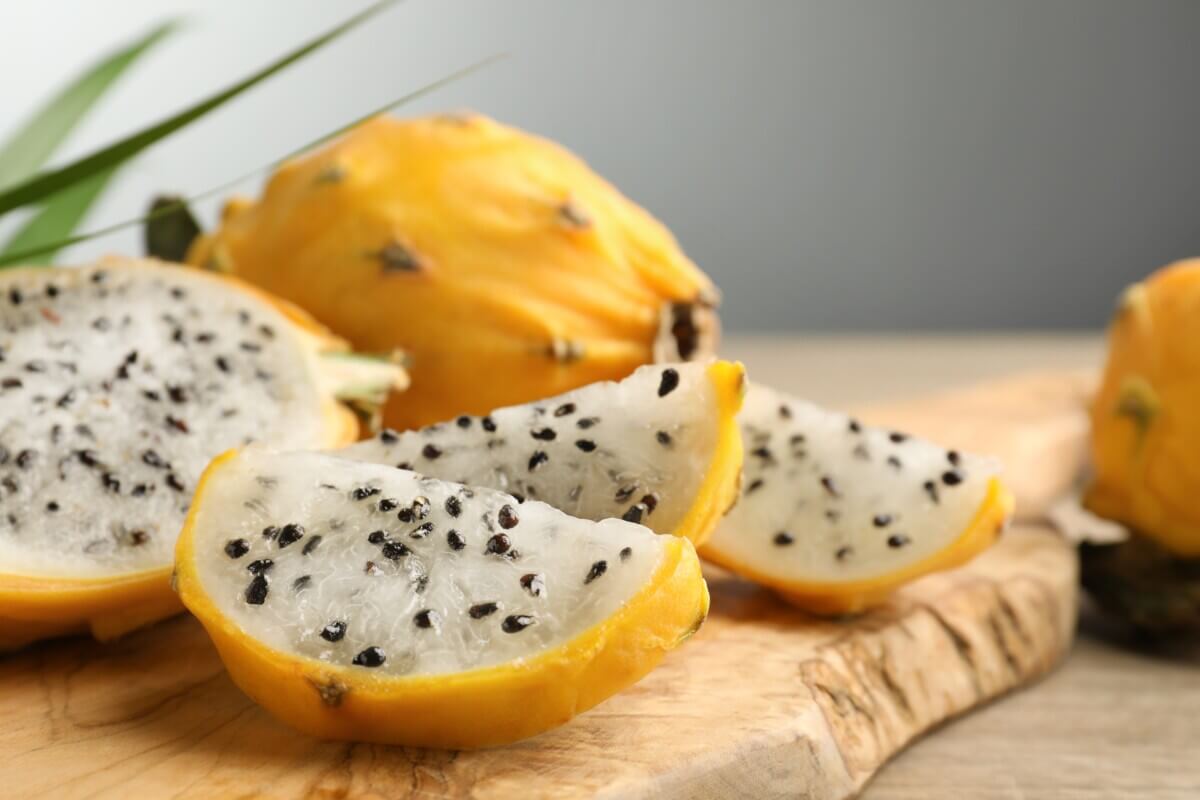
(Credit: New Africa/Shutterstock)
Have you ever tried yellow dragon fruit to help you lose weight or go to the bathroom after a week of constipation? Some wellness Tiktokers have, and now they want you to give it a try, too. Some users have posted about how shocked and confused they were after eating dragon fruit — and then about how pleased they were with the results. So, does a yellow dragon fruit cleanse really work, and do you really need to try it?
What is yellow dragon fruit?
The tropical fruit is part of the cactus family and is native to Central and South America. Its bright yellow exterior, translucent white flesh, and edible black seeds make it stand out among its other varieties. Some describe the fruit as a cross between a pear and a kiwi, while others say it tastes more like a pear and pineapple. Regardless, plenty think that it has a tasty flavor and makes for a new and refreshing option to add to your normal fruit rotation.
Is yellow dragon fruit cleansing?
You might feel it is if you eat it and find that it gets you sprinting to the bathroom. However, it's important to know that the fruit isn't a “cleanse” or “detox,” it's just high in fiber. One whole yellow dragon fruit packs five to six grams of fiber, so there's no question that it can have a laxative effect. There is lots of soluble fiber present, which acts as a gel in your body that helps maintain steadier blood sugar levels by slowing down the absorption of sugar, lowering cholesterol, and reducing heart disease risk.
Considering most Americans get 10 to 15 grams of fiber daily (compared to the 25-38 grams of recommended intake), getting six or more grams in one sitting could make you pass more bowel movements than usual. This is especially true if you up your water intake alongside eating more fiber. If you don't drink enough water, you might end up right where you started. Fiber absorbs water which helps it confer health benefits to the body.
Some think that since the fruit helps “clean them out,” they are losing weight because of it. The fruit doesn't have any special fat-burning or weight-dissolving properties. You may just be experiencing water weight loss. While regular fiber intake can help promote weight loss and healthy weight maintenance, it doesn't work immediately. Fiber helps you feel fuller for longer, which makes you less likely to overeat. Fast food, fried foods, baked goods, and highly processed snack foods are typically the lowest in fiber, so the likelihood of overeating them is much higher.

Are there any downsides to eating yellow dragon fruit?
Not generally speaking, but there are always exceptions. For people who aren't used to eating a lot of fiber in one sitting, it could cause some effects like diarrhea. For those who normally eat sufficient fiber, this is less likely to happen. If you're worried, you can always try eating a little bit and then working your way up to a whole fruit.
Bottom Line
If you've been constipated and aren't sure why, trying yellow dragon fruit could definitely be worth it. As a dietitian, I will always encourage more fruits and veggies in a diet. However, you can get the same amount of fiber from fruits like apples, berries, and foods like chia seeds. If you have trouble with regular bowel movements, including a variety of fruits in your diet regularly will be more beneficial than just adding yellow dragon fruit without making other meaningful changes.










